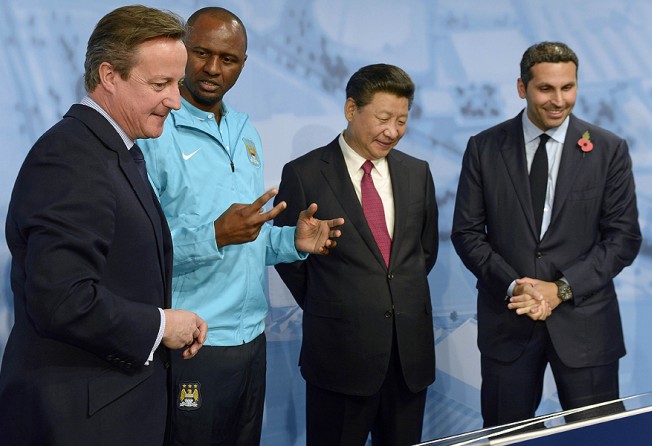
Xi Jinping plays up football passion for political advantage at home and abroad
'The beautiful game' that president graces with his presence in Manchester helps him connect with people at home and abroad

President Xi Jinping is known for his passion for football. But he is also a good player in the fields of "soccer diplomacy" and "soccer politics", as shown by his just-concluded state visit to Britain, the birthplace of modern soccer.
On Friday in Manchester - the cradle of two world-class Premier League football clubs and the last stop of his four-day trip, Xi once again showed off the diplomatic skills that had attracted much attention before.
In the past week, major mainland media outlets had chronicled Xi's "soccer diplomacy activities". Published pictures included him kicking a ball in Ireland, receiving a Bayer 04 Leverkusen uniform at a German pharmaceutical firm and chatting with former Dutch national player Edwin van der Sar - also the legendary goalkeeper for Manchester United - at a banquet hosted by Dutch King Willem-Alexander.

Xi played football in junior high. But apparently, his desire for the sport goes beyond personal fondness. Having presented himself time and again as a fan and keen supporter of promoting the sport in China, Xi has subtly brought the nation into the global network of soccer diplomacy.
The efforts are also designed to showcase the softer side of the often tough communist leader in the eyes of the public.
China News Service said Xi's soccer diplomacy would now cover a new territory - Manchester city. Xi has reportedly "dreamed" of visiting Old Trafford, home of Manchester United. But instead, he has set foot on the Etihad because of both soccer politics and soccer diplomacy.
Politics certainly played a part in Xi's decision as his visit coincided with the official inclusion of Chinese footballer Sun Jihai , a City player between 2002 and 2008, into English football's Hall of Fame on the same day. The "China Sun" was the football club's first Chinese player.
The visit was also aimed at courting Sheikh Mansour, a member of Abu Dhabi's ruling family and one of the world's wealthiest men, who owned not only City but also many other sports clubs around the world. "It is undeniable that football, as one of the world's most influential sports, in a sense, has become an integral part of [Xi's] diplomacy," China News Service said in a commentary.
As well, the charm offensive would help Xi deliver his message to domestic audiences.
Communist Party leadership has traditionally treated sport as a way to boost national morale and pride and, by extension, to legitimise communist rule. While China has enjoyed remarkable Olympic success, Chinese football remains its Achilles' heel as the national team has long been a source of national embarrassment rather than pride.
Since taking office, Xi has put football on his work agenda. Under his stewardship, a recent Politburo meeting chaired by him contributed to discussions of soccer development in the country. The government set up a high-level task force led by Vice-Premier Liu Yangdong to coordinate the efforts. It also declared football a compulsory part of the national curriculum and pledged to build about 20,000 themed schools by 2017, with the goal of nurturing more than 100,000 players.
The publicity surrounding his enthusiasm for "the beautiful game" might be part of a broader plan to help him forge a man-of-the-people image. China Daily said Xi's love of football helped him score a success in his public image.
Xi has made known his three wishes for Chinese football: to qualify for the World Cup, to host the event and, one day, to win it. The new emperor of the communist dynasty has apparently put on new clothes, improving the sport as an inalienable part of his political agenda of the "Chinese Dream".